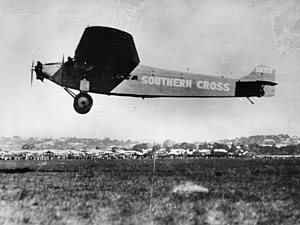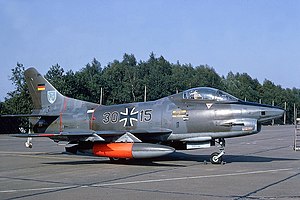| Name | name | The subject of the article. When naming aircraft, please do not repeat the name of the manufacturer unless the name would be otherwise ambiguous. For example, "P-51 Mustang" does not need to have "North American" in front of it: the aircraft name is unambiguous and the manufacturer will be stated just a few lines down in the Type Infobox. Some exceptions exist, such as aircraft which only have model numbers; e.g. "Boeing 707".
| String | required |
|---|
| Logo | logo | aircraft logo. It will be displayed above aircraft image. In the format filename.xxx format with or without 'File:' tag
| File | optional |
|---|
| Logo Size | logo_size | Allows for the specification of logo size. Default is 210px.
| String | optional |
|---|
| Logo Border | logo_border | set to yes to add a thin border to the logo - Suggested values
yes
| String | optional |
|---|
| Logo Alt | logo_alt | Alt text for the image, for readers who cannot see the logo. Please see WP:ALT for details.
| String | optional |
|---|
| Image | image | In the format filename.xxx format with or without 'File:' tag
| File | optional |
|---|
| Image Size | image_size | Allows for the specification of image size. Default is 300px.
| String | optional |
|---|
| Size | size | Allows for the specification of image size. Default is 300px. Alternatively use "image_size".
| String | optional |
|---|
| Image Border | image_border | set to "yes" to add a thin border to the image
| String | optional |
|---|
| Image Alt | alt | Alt text for the image, for readers who cannot see the image.
| String | optional |
|---|
| Image Caption | image_caption | A short (one- or two-line) caption for the image. If it isn't descriptive, then please skip it.
| String | optional |
|---|
| Long Caption | long_caption | A longer (multi-line), more detailed caption may be desirable from time to time. Long captions will appear left-justified in the Infobox.
| String | optional |
|---|
| Other Names | other_names | any alternative names the aircraft or program may have.
| String | optional |
|---|
| Type | aircraft_type | What this particular aircraft is an example off. Unique aircraft will not need this parameter - Example
- "Enola Gay" is a Boeing B-29 Superfortress
| String | optional |
|---|
| Role | aircraft_role | The aircraft's role - Example
- airliner, military trainer aircraft, agricultural aircraft, firefighting aircraft, etc.
| String | optional |
|---|
| National Origin | national_origin | The country where the aircraft or program was manufactured or initiated. List collaborative programs of only 2 or 3 nations; for more than 3, use "Multi-national". For licensed aircraft with a separate article, include both the originating country and the licensee country for simple variants and developments. The originating country may be omitted if it is a derivative design.
| String | optional |
|---|
| Manufacturers | manufacturers | the company or companies responsible for designing and building the aircraft.
| String | optional |
|---|
| Design group | design_group | the name of the group(s) that designed the aeronautical item. Do not list if same as the manufacturer.
| String | optional |
|---|
| Designer | designer | the person who designed the aircraft or led the design. Not appropriate for company chief designers, project leaders, teams, etc. unless they led the actual engineering design.
| String | optional |
|---|
| Builder | builder | the group that only builds the aeronautical product, but is not responsible for design of it.
| String | optional |
|---|
| Issuer | issuer | the government agency or other authority that issued the design and/or production contract for the aircraft or program.
| String | optional |
|---|
| Owners | owners | the individuals or organizations that own, manage or uses the aircraft.
| String | optional |
|---|
| Primary Users | primary_user | The primary user of the civilian aircraft list only one user. Do not use for individual aircrafts - Example
- Lufthansa, Air Canada, United Airlines
| String | optional |
|---|
| More Users | more_users | Limited to THREE (3) "more users" here (4 total users). List users with {{plainlist}} or {{unbulleted list}}.
| String | optional |
|---|
| Service | service | the branches of the military or other organizations that have operated the aircraft or program.
| String | optional |
|---|
| Proposals | proposals | any proposals for the aircrafts or careers in the specific program, that were not accepted or built.
| String | optional |
|---|
| Prototypes | prototypes | any prototype versions of the aircraft that were built.
| String | optional |
|---|
| Number Built | number_built | The total number of the aircraft or aircraft engine built.
| String | optional |
|---|
| Civil Registration | civil_registration | the registration number assigned to the aircraft for civilian use.
| String | optional |
|---|
| Military Serial | military_serial | the serial number assigned to the aircraft for military use
| String | optional |
|---|
| Radio Code | radio_code | military radio codes where this is a commonly-used way of identifying this aircraft
| String | optional |
|---|
| Requirement | requirement | a formal name or a number for the requirement.
| String | optional |
|---|
| Aircraft Carried | aircraft_carried | type of aircraft carried, usually only for mothership aircraft
| String | optional |
|---|
| Flights | flights | the total number of flights that the aircraft has made
| String | optional |
|---|
| Total Hours | total_hours | the total number of hours the aircraft has flown
| String | optional |
|---|
| Total Distance | total_distance | the total distance the aircraft has flown
| String | optional |
|---|
| Construction Date | construction_date | the date construction of the aircraft began
| Date | optional |
|---|
| Introduction | introduction | the date the aircraft was first introduced into service
| String | optional |
|---|
| Initiated | initiated | the date the program was begun
| String | optional |
|---|
| In Service | in_service | time in military or revenue service, as a range of dates
| String | optional |
|---|
| First Flight | first_flight | the date of the aircraft's first flight
| Date | optional |
|---|
| Last Flight | last_flight | the date the specific aircraft, not the general type, last flew
| String | optional |
|---|
| concluded | concluded | the date that the program was concluded or ended; alternatively, the date of the outcome
| String | optional |
|---|
| expected | expected | the expected or anticipated result; or what is regarded as likely
| String | optional |
|---|
| outcome | outcome | the outcome of the program
| String | optional |
|---|
| Fate | fate | the fate of the aircraft after it was retired from service (e.g. scrapped, sold, etc.)
| String | optional |
|---|
| Related | related | Variants of this aircraft with their own articles or related programs for aircraft programs
| String | optional |
|---|
| Predecessors | predecessors | any earlier designs or proposal or program that directly led to the development of the current aircraft or initiative.
| String | optional |
|---|
| Developed From | developed_from | any earlier designs from which the aircraft was developed
| String | optional |
|---|
| Developed Into | developed_into | any later designs that were developed from the aircraft
| String | optional |
|---|
| Preservation | preservation | whether the aircraft is currently preserved in a museum or other collection
| String | optional |
|---|
| Successors | successors | any later designs or proposal or program that were directly influenced by the currently discussed aircraft
| String | optional |
|---|
| Notes | notes | Any additional notes
| String | optional |
|---|






